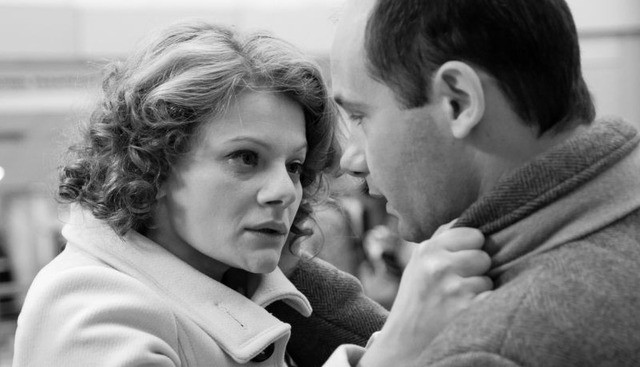 OFELINA POPII AND SORIN LEOVEANU IN QUOD EST DEMONSTRANDUMThe personal and the intellectual in communist Romania
OFELINA POPII AND SORIN LEOVEANU IN QUOD EST DEMONSTRANDUMThe personal and the intellectual in communist RomaniaAndrei Gruzsniczki's Romanian film,
Quod Erat Demonstrandum, concerns the depredations of life in the Eastern Bloc during the Cold War, specifically in the mid-Eighties, when the Berlin Wall was not down yet but citizens were straining at the bit to be released from the iron control of Russia and the Communist Party. There have been plenty of films about this topic before. It would be hard to make anything richer, more atmospheric, or more fascinatingly plotted than Florian Henckel von Donnersmarck's
The Lives of Others. But this new film's existence has plenty of justification. It has its own particular story to tell. It has its vivid lead character, a brilliant mathematician held back because he isn't a loyal communist or eager informer. And shot on film in beautiful black and white, it captures the looks and manners of its time and place with unusual precision.
Quod Est Demonstrandum has its own story to tell, but what underlies that story is how the communist system of repression, intimidation, informing and bribing weaves its way into relationships and stifles intellectual progress. In the foreground at first is the problem faced by Sorin Parvu (Sorin Leoveanu), the most talented mathematician of his Romanian generation, whose associates called him "Einstein." He has plans for wave motion research that plainly can lead to a whole panoply of important practical applications. But earlier in his career he was blocked from going far in work with Fourier analysis because he couldn't get hold of the books. He is in his 40's and still hasn't finished his Ph.D. Lucian (Dorian Boguta), a lesser colleague who tows the ideological line and begins helping state security to spy on Sorin, gets the trips abroad Sorin has been denied and lives in a posh apartment and has the books.
As Parvu, Sorin Leoveanu makes an interesting protagonist. He's balding, not conventionally handsome. He lives with his mother. But he has a keenness, energy, and mystery about him. He is involved with Ducru, a mathematician friend who has escaped to France, and Sorin sees a lot of Ducru's' wife Elena Buciuman (Ofelia Popii), who works with computers, and her son David (Marc Titieni). Sorin's relationship with Elena is a little ambiguous; she's obviously more of a friend of a friend to him -- something else that may be used against him, along with his too great independence as a thinker and dodging of rules.
Alecu Voican (Florin Piersic Jr.), an overeager and frustrated agent of Securitate (the Romanian spy network) is put on Sorin's case when it's learned that he's published a paper in the US -- without getting prior approval. Even though the theorem in it has no practical or strategic application, a big fuss is made over this breach by the authorities. Alecu enlists Lucian to look into Sorin. Then he decides to get at Sorin through Elena. Alecu's ploy is to pose as an officer of the passport office specially assigned to Elena's case. Securitate is very exercised over Ducru's de facto defection to France. Alecu makes it look hard for Elena to get to France to rejoin her husband -- hard enough so she may become willing to betray her friend Sorin. Things don't, however, turn out as expected.
Several memorable scenes are the one of cars in line being pushed by hand up to a gas station; lights going out during a bridge game; Alecu having ice cream twice, with two different women; David trying out his French and taking Latin lessons; the hideous patterns of Sorin's mother's dress and armchair. Director Gruzsniczki may seem to meander a bit, but he builds up to excitement in the final minutes in the airport, which are climactic, yet leave things ambiguous. There should be no clear resolution of a situation or a life in a Cold War Eastern Bloc story set in the mid-Eighties, and there is none.
Everything about this film looks and feels authentic, and the way the film stock captures gray shadings digital can't is a pleasure to see. But what's most important is how the viewer gets to feel the way the system makes betrayal of one's values and one's intimates inevitable.
Quod Erat Demonstrandum, 107 mins., debuted at Rome (Nov. 2013), where it won the Jury Prize. Screened for this review as part of the Film Society of Lincoln Center-Museum of Modern Art 2014 New Directors/New Films series where it shows Thursday, March 20, 9:00pm – FSLC; Saturday, March 22, 3:30pm – MoMA.





